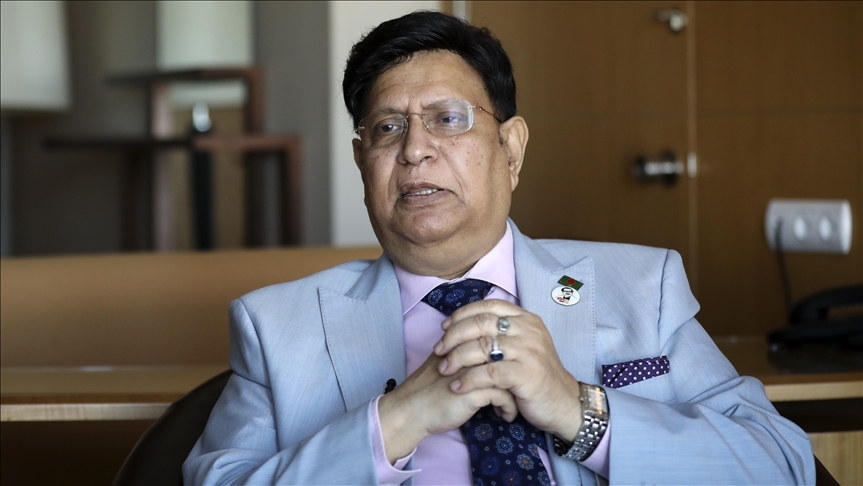Bangladesh claims Rohingya relocation is life-saver
The relocation decision has been taken to avoid deaths and accidents in overcrowded hilly areas, says Foreign Minister
 Bangladeshi Foreign Minister AK Abdul Momen
Bangladeshi Foreign Minister AK Abdul Momen
DHAKA, Bangladesh
Bangladesh defended a controversial plan Friday to relocate Rohingya refugees to a remote island as a move to protect the persecuted people from risks, the nation’s top diplomat told Anadolu Agency.
Despite an outcry by the international community on safety and rights, Bangladesh transferred the first batch of 1,642 Rohingya on Friday to Bhashan Char, a distant island in the Bay of Bengal.
Another 3,500 will be sent to the island this week and the relocation is expected to be completed within a week, the Bangladesh Sangbad Sangstha news agency reported, citing naval sources.
Hosting more than 1 million Rohingya within its borders, the South Asian country has erected concrete settlements on the island to house 100,000 Rohingya in the first phase, investing more than $350 million.
In a message to Anadolu Agency late on Friday, Foreign Minister AK Abdul Momen thanked premier Sheikh Hasina for her “decisive action” to transfer a portion of Rohingya living in the squalid makeshift tents in the southern district of Cox’s Bazar to Bhashan Char.
Momen claimed Hasina decided on the plan “to avoid deaths and accidents due to landslides and other untoward incidents in the overcrowded hilly areas of Kutupalang,” in the world’s largest refugee camp.
Underlining that concrete structures on the island would “provide better living for the time being,” Momen pointed out that “drug trafficking” and the “flesh-trade” have led to the deterioration of law and order in refugee camps in Cox’s Bazar.
International rights defenders, including the UN, slammed Bangladesh for starting the transfer without any professional feasibility studies by international experts on the island.
Some have warned that the silty island, which emerged from the water only 20 years ago, is prone to flooding and its inhabitants would face the risk of being washed out during a cyclone or stormy weather.
According to officials and locals, the distant island located 50 kilometers (31 miles) off Bangladesh’s southwestern coast remains disconnected from the mainland -- and any potential assistance -- during natural disasters.
In opposition to these international concerns, a Foreign Ministry statement said Friday that “the accommodation in Bhashan Char is strongly-built with concrete foundation which can withstand natural disasters such as cyclones and tidal waves.”
Referring to the recent Cyclone Amphan that hit Bangladesh and India in May, it said: “Despite the heightened tidal wave, all the 1,440 houses and 120 shelter stations in the island remained unharmed.”
Assuring uninterrupted services to the stateless people on the island, it added that “in addition to Government agencies, around 22 NGOs are already there to extend all possible support to the relocated Rohingya.”
Commander Abdullah Al Mamun Chowdhury, director of the Bhasan Char Rohingya Camp Rehabilitation Project, told Anadolu Agency that “we’ve received them [Rohingya] and as per government directions. We’re resettling them. We’re fully ready to provide full support to 100,000 Rohingya here.”
Appeal for action against Myanmar
Momen criticized the international community for failing to take any punitive measures for the alleged atrocities committed against Rohingya in his country’s eastern neighbor Myanmar.
He underlined in his message to Anadolu Agency that trade and investment had flooded into Myanmar from Europe, Southeastern Asia, China, Japan, the UK and other countries and regions over the past three years despite the human rights violations.
“None of the Human Rights organizations have started any blockade of those countries that are heavily investing in Myanmar nor asking for divestment as they did in the case of Apartheid in South Africa,” he added.
According to Amnesty International, more than 750,000 Rohingya refugees, mostly women and children, fled into Bangladesh after Myanmar forces launched a crackdown on the minority Muslim community in August 2017, pushing the number of persecuted people in Bangladesh above 1.2 million.
Since Aug. 25, 2017, nearly 24,000 Rohingya Muslims have been killed by Myanmar’s state forces, according to a report by the Ontario International Development Agency (OIDA).
More than 34,000 Rohingya were thrown into fires while over 114,000 others were beaten, said the OIDA report, entitled Forced Migration of Rohingya: The Untold Experience.
As many as 18,000 Rohingya women and girls were raped by Myanmar’s army and police and more than 115,000 Rohingya homes burned down, while 113,000 others vandalized, it added.
Anadolu Agency website contains only a portion of the news stories offered to subscribers in the AA News Broadcasting System (HAS), and in summarized form. Please contact us for subscription options.

